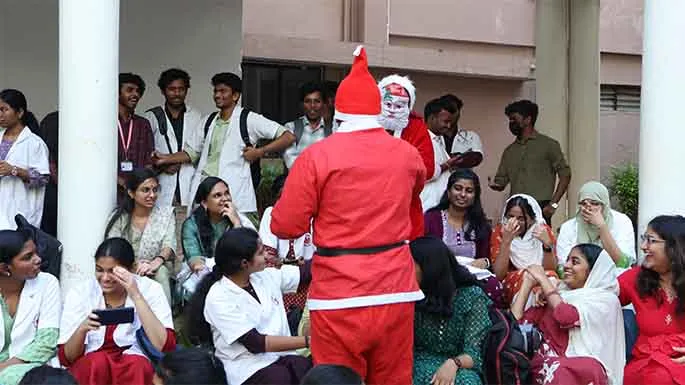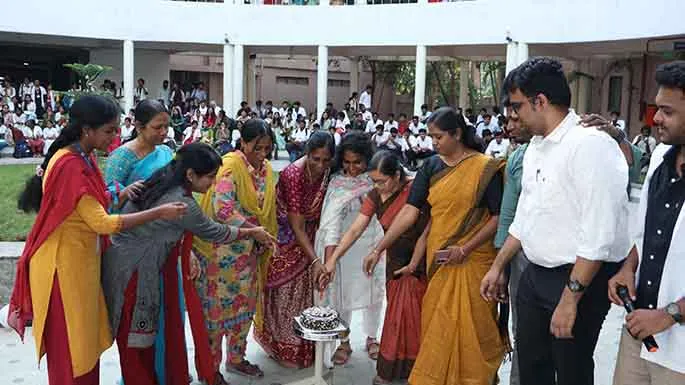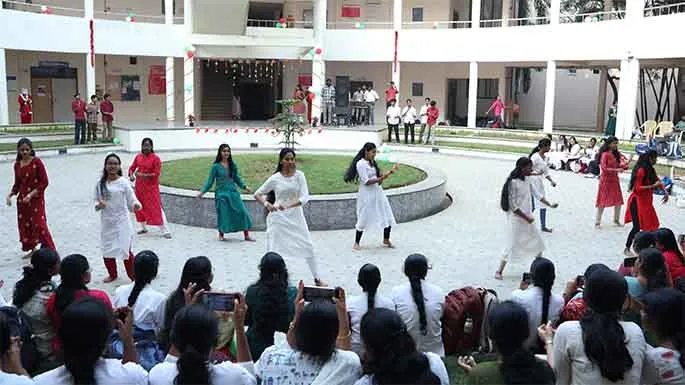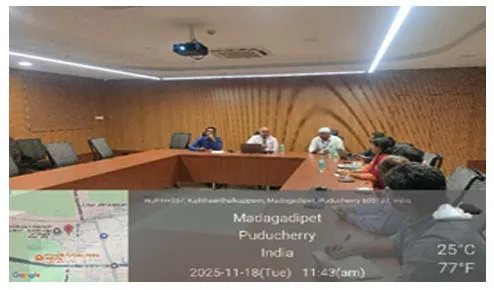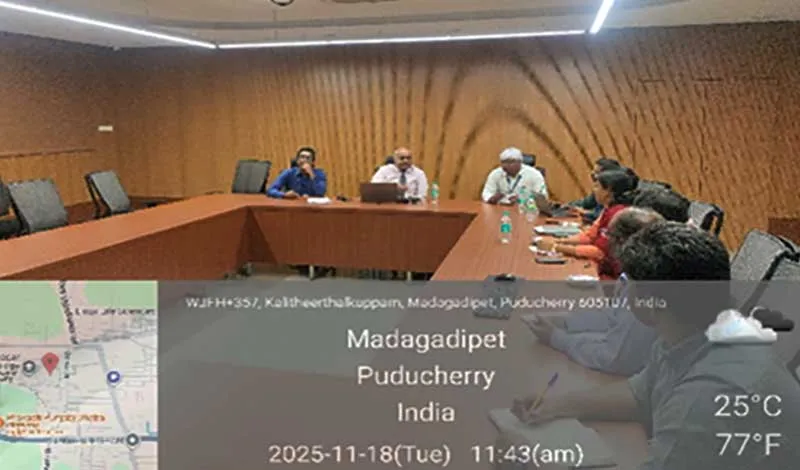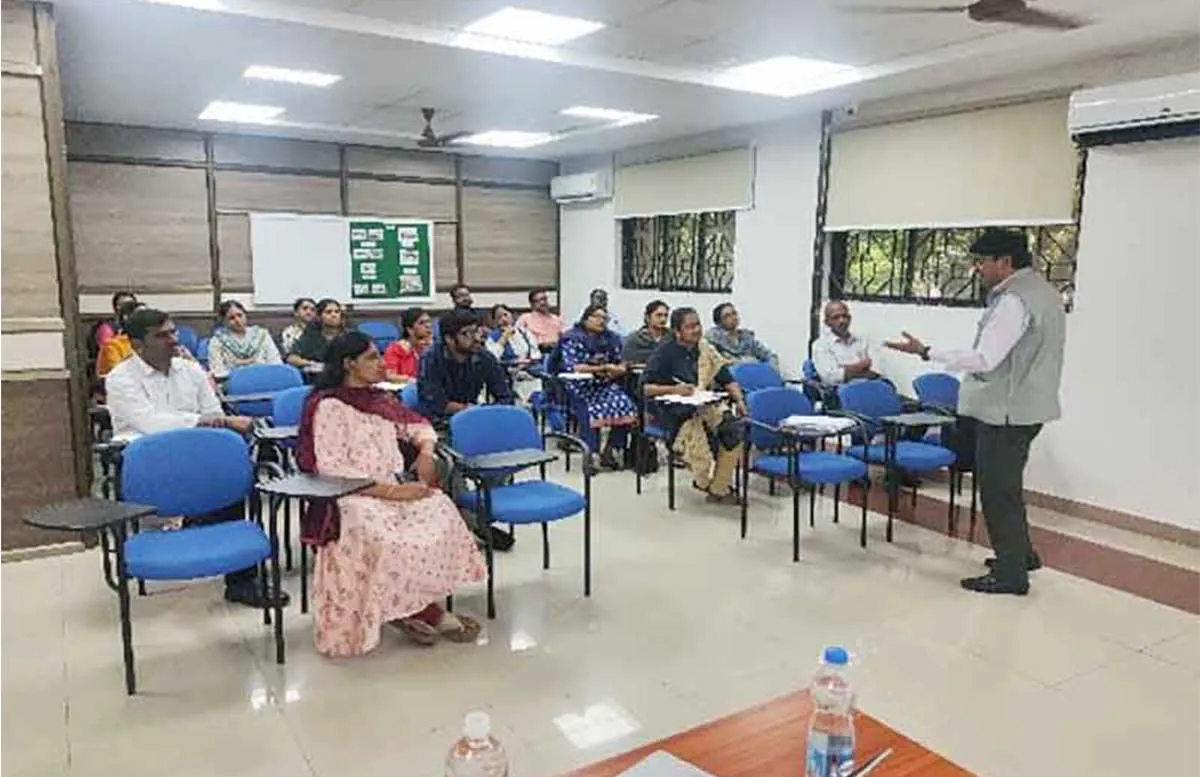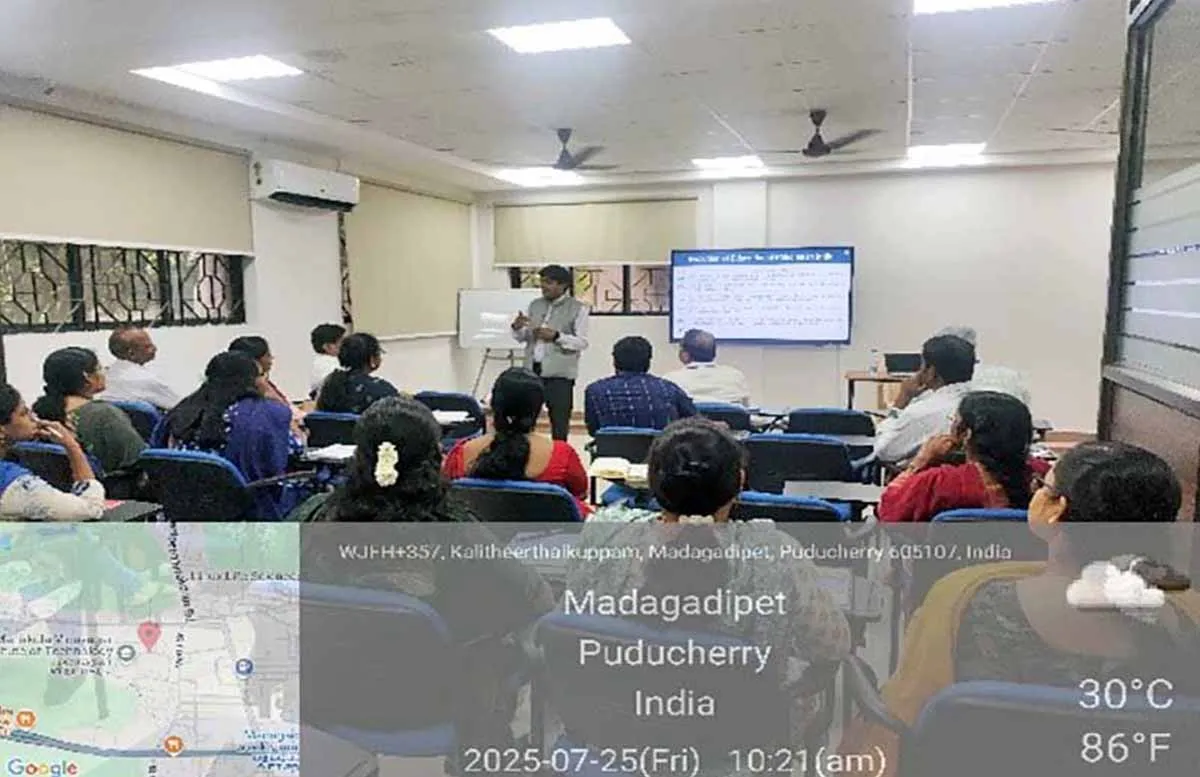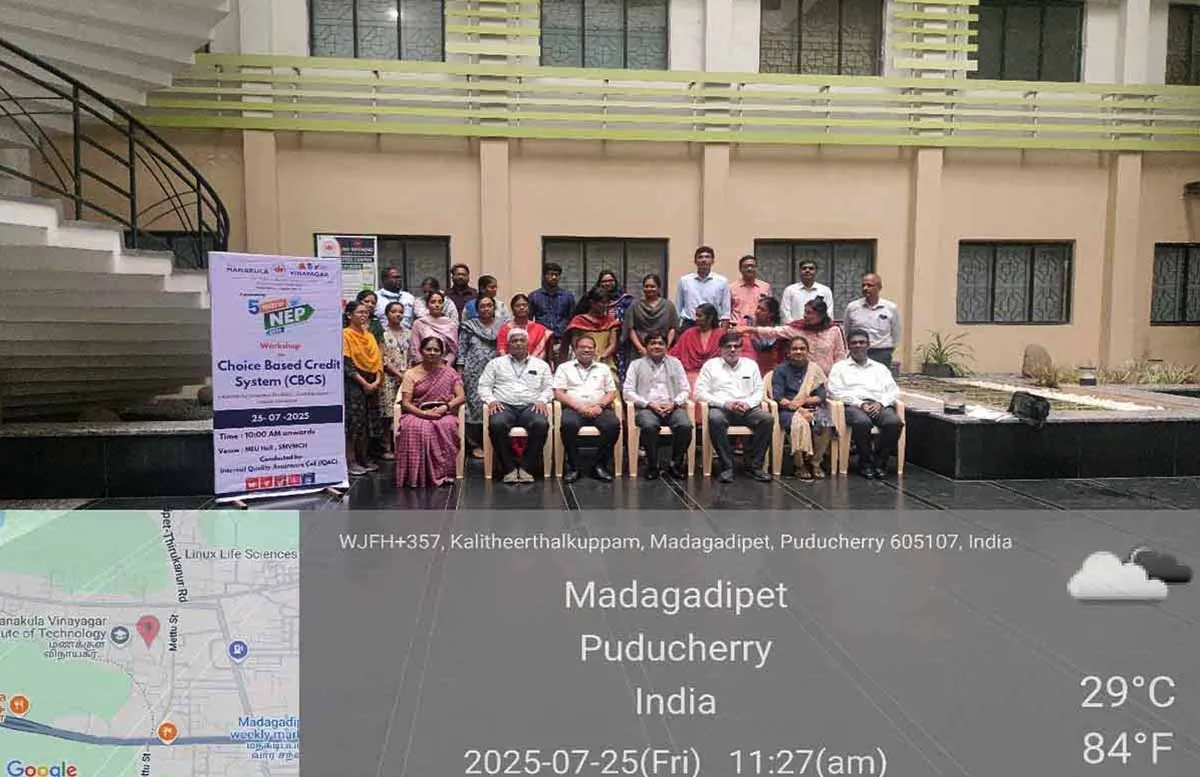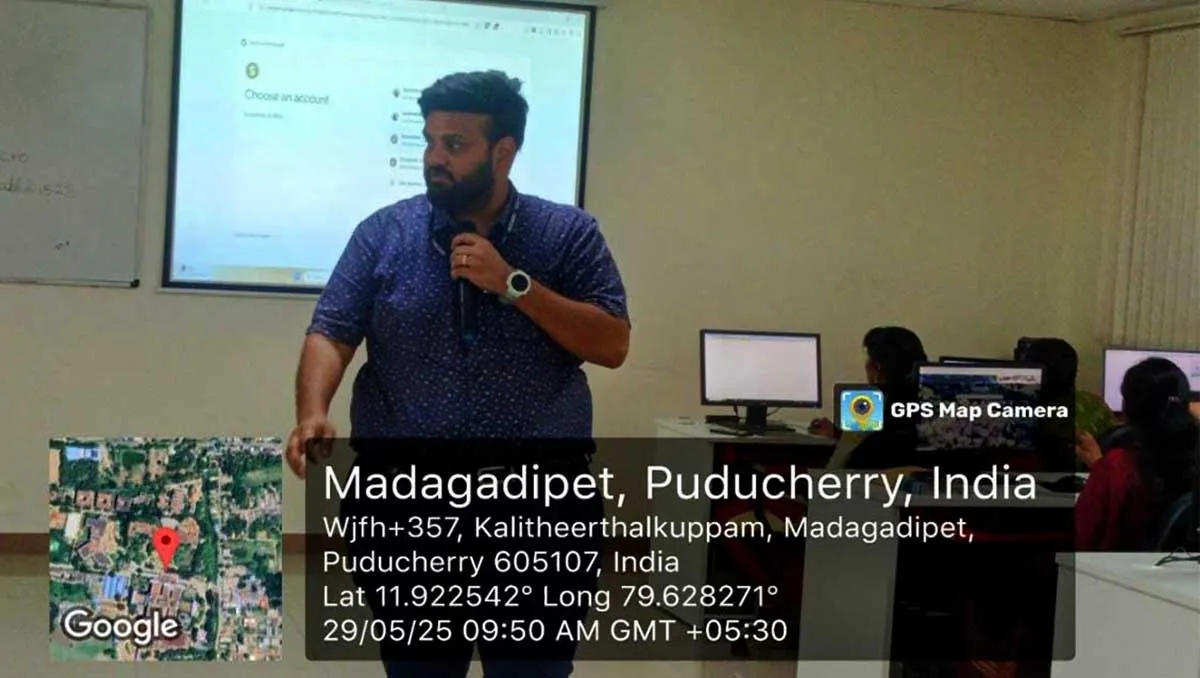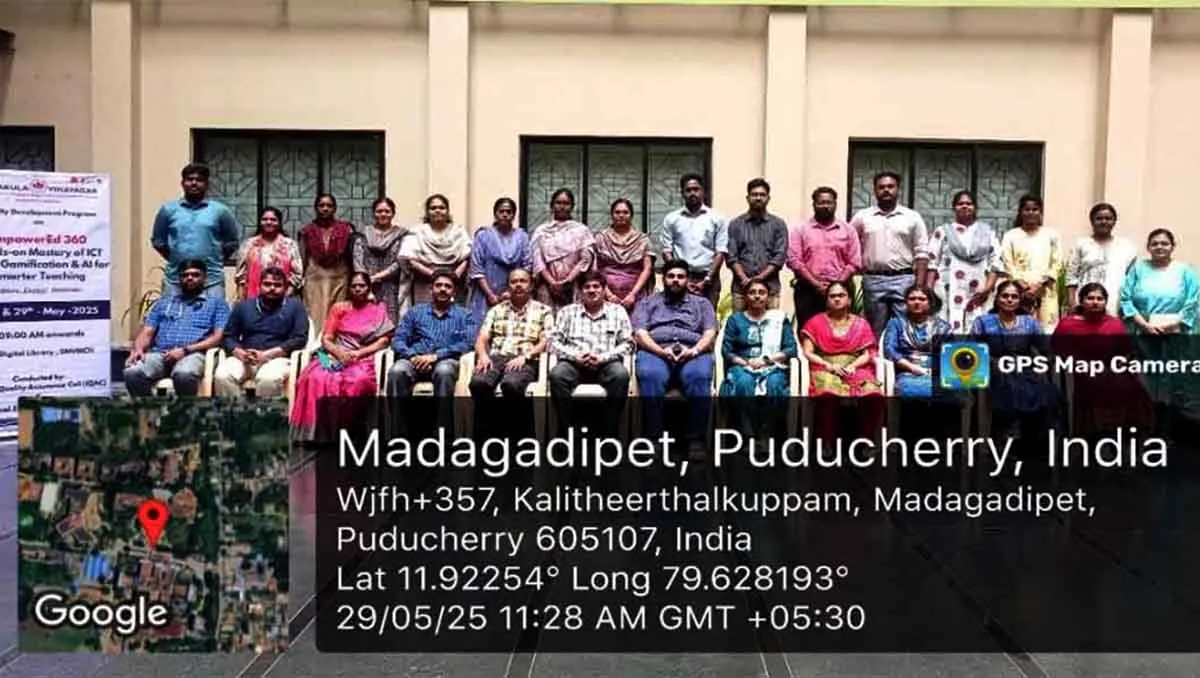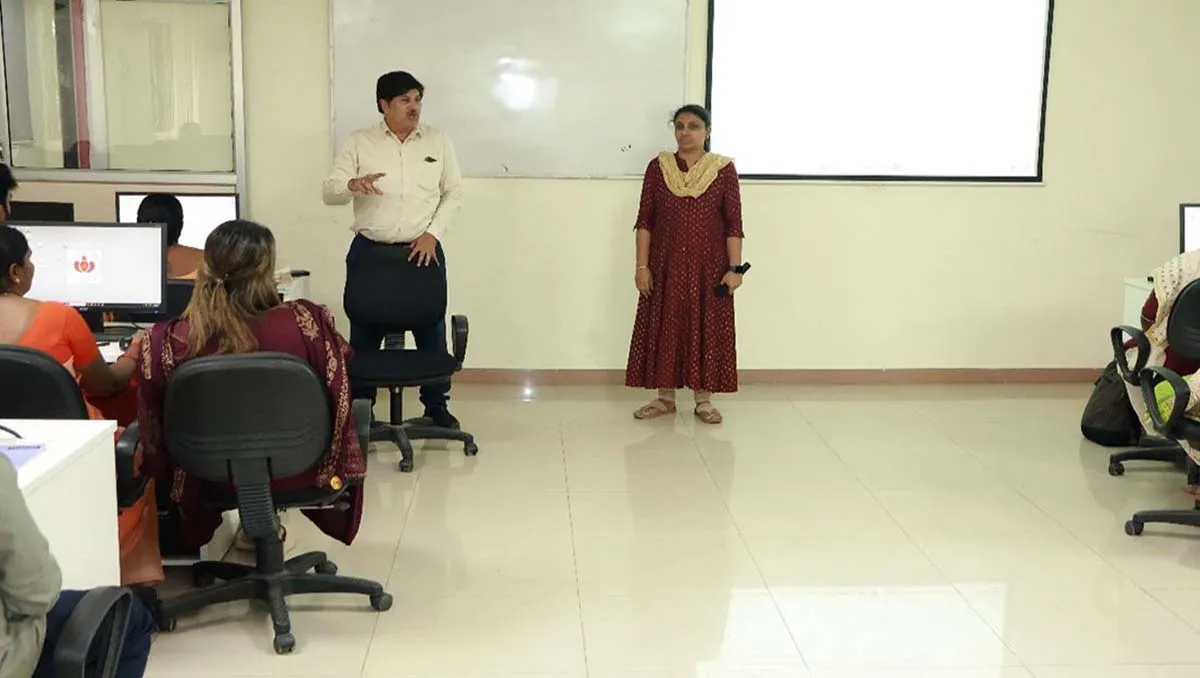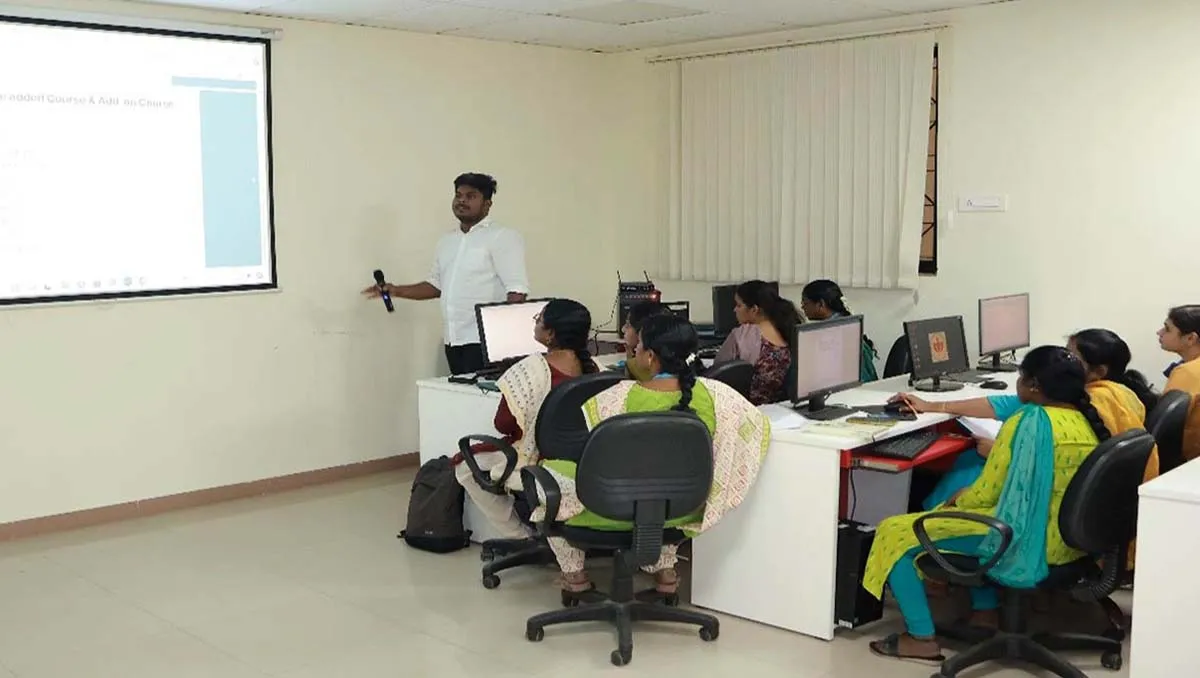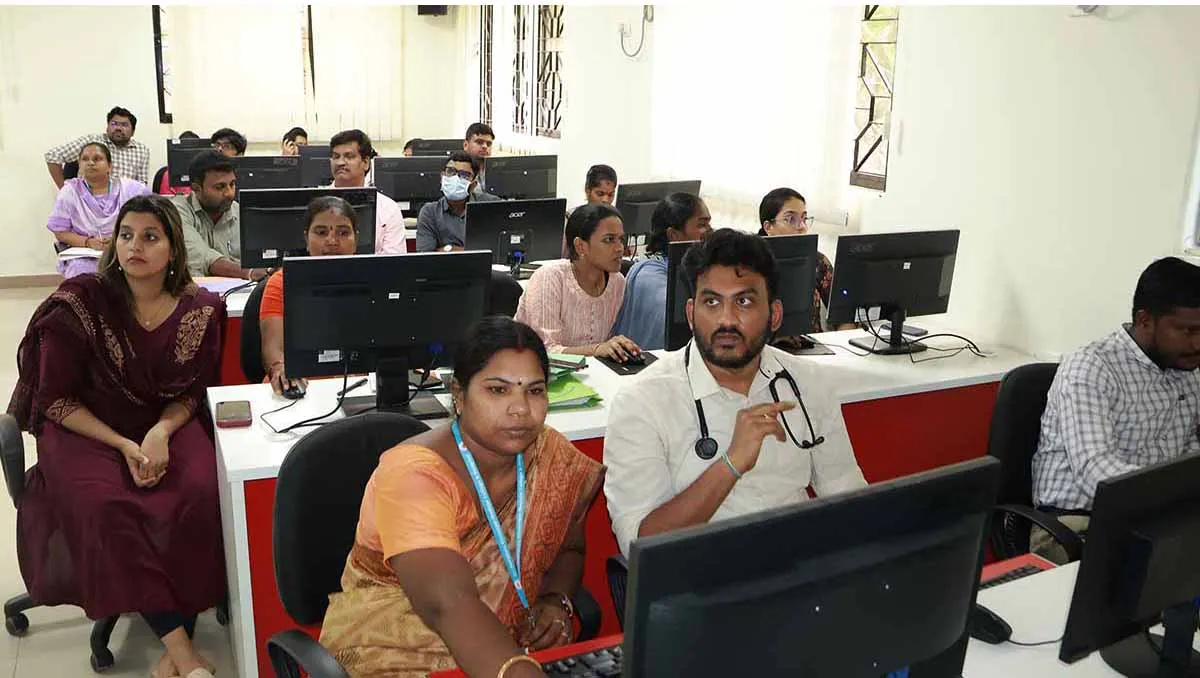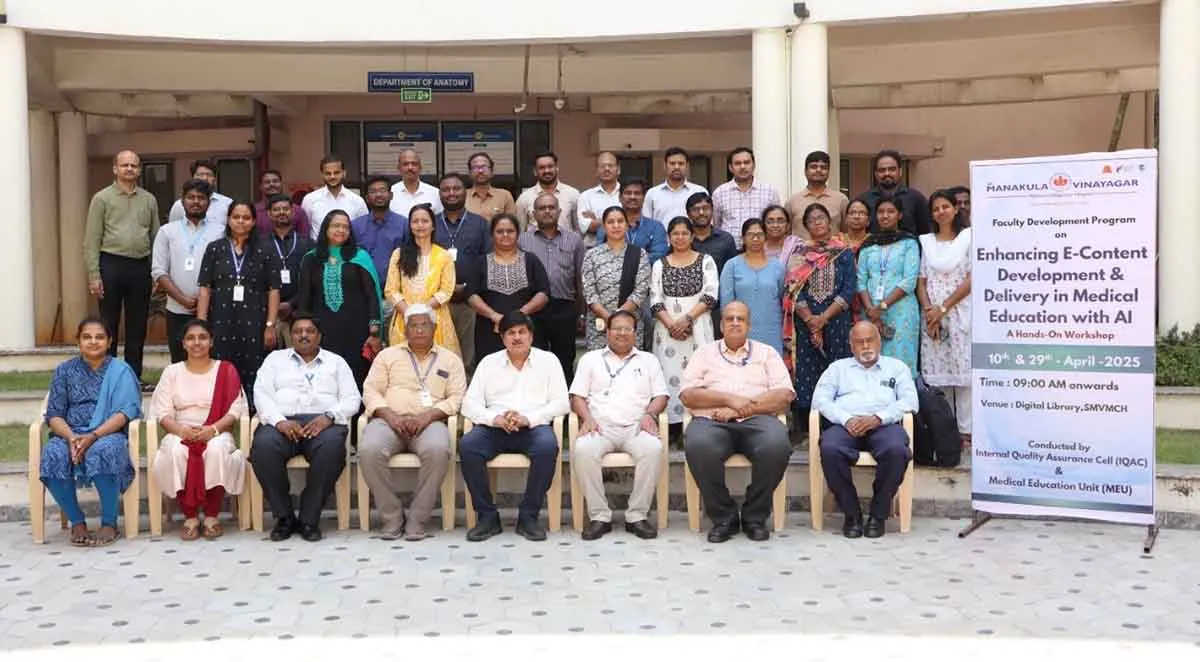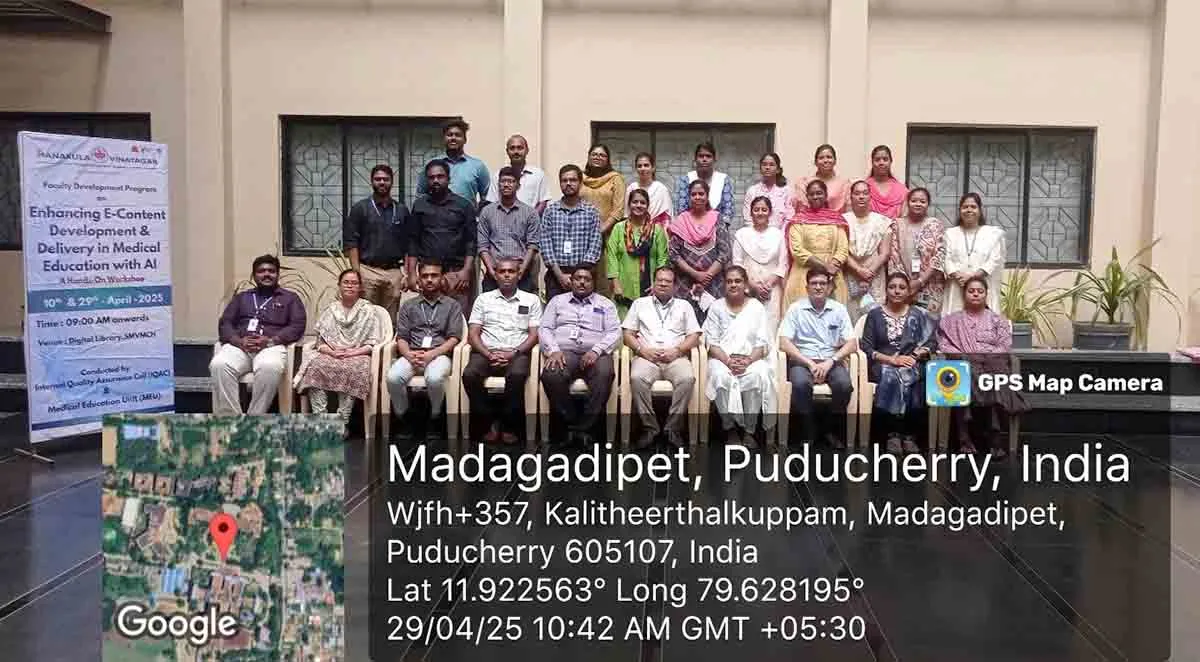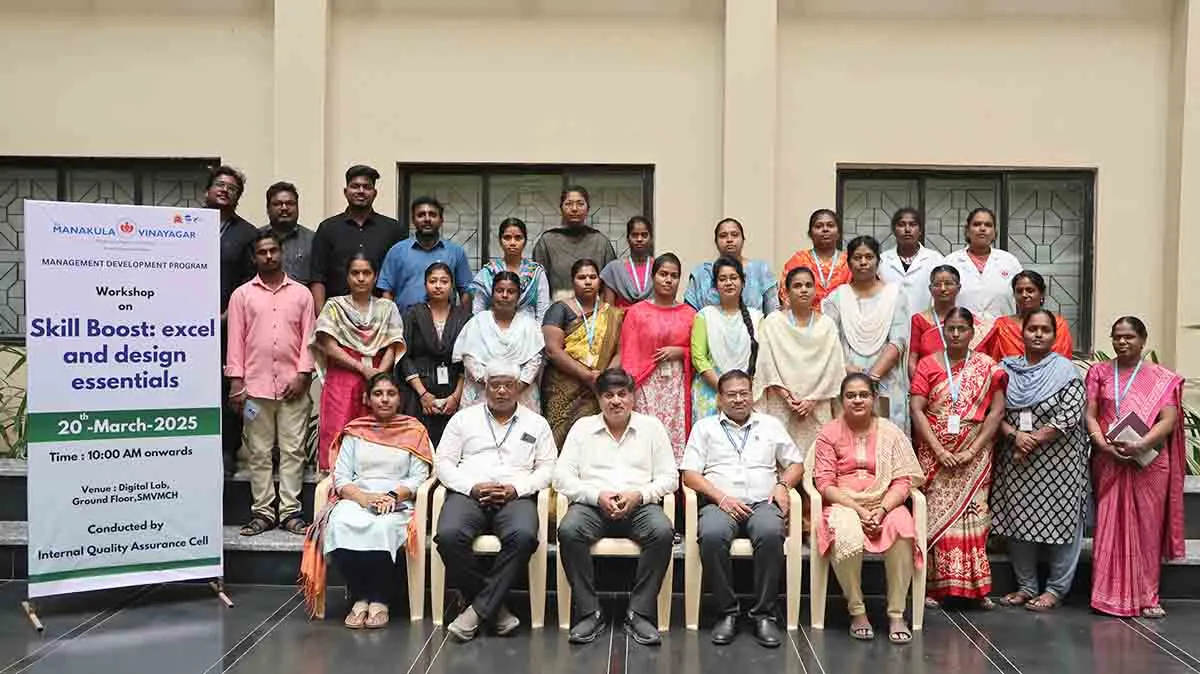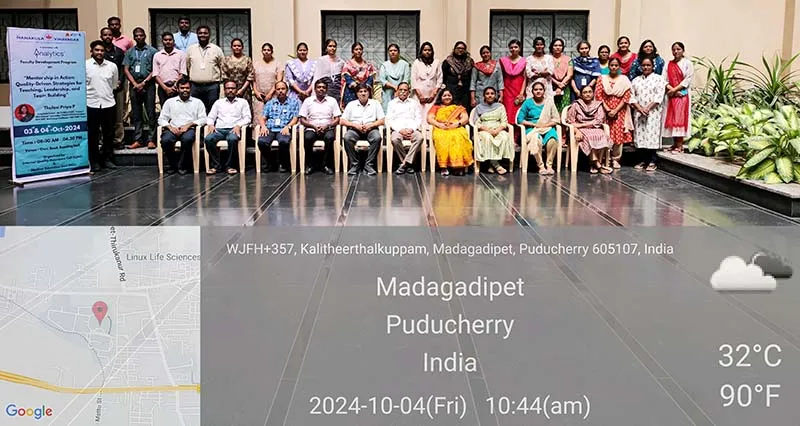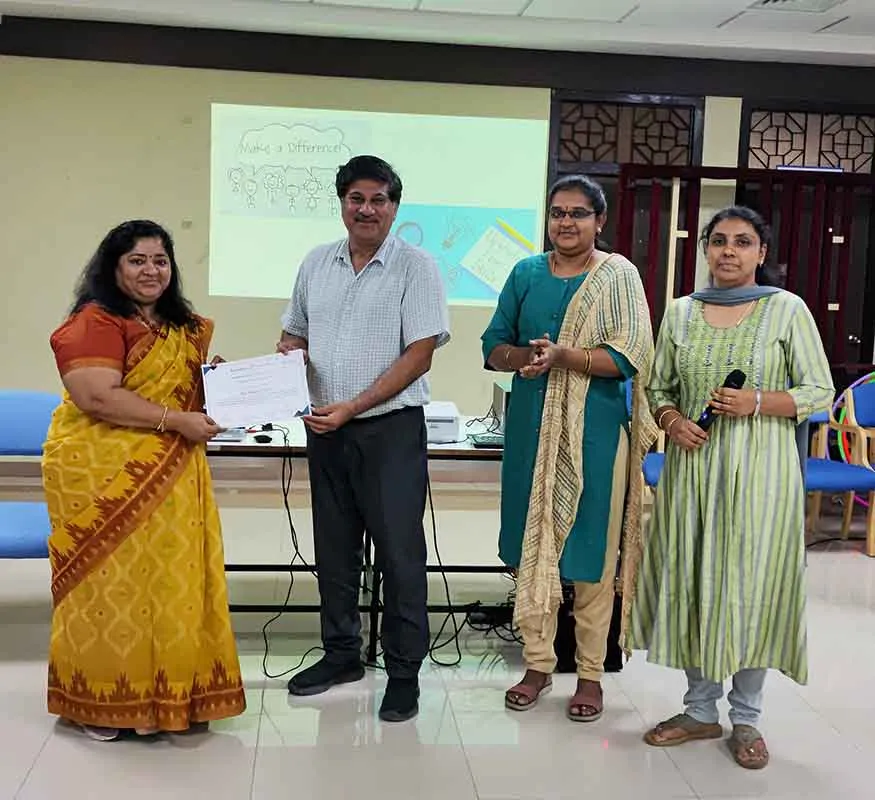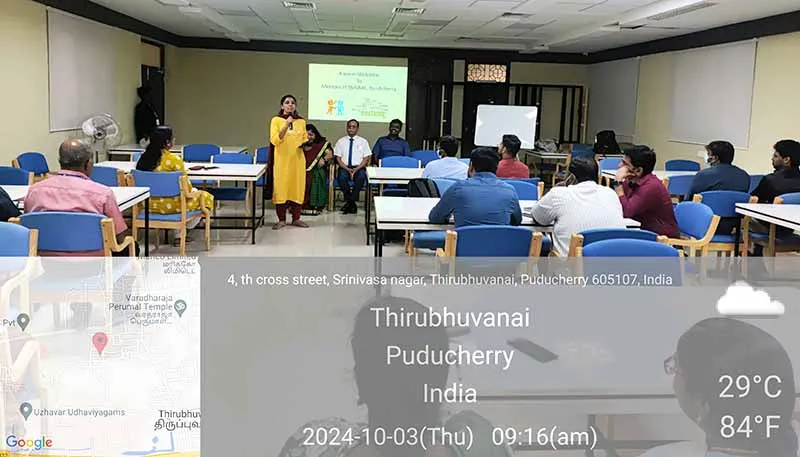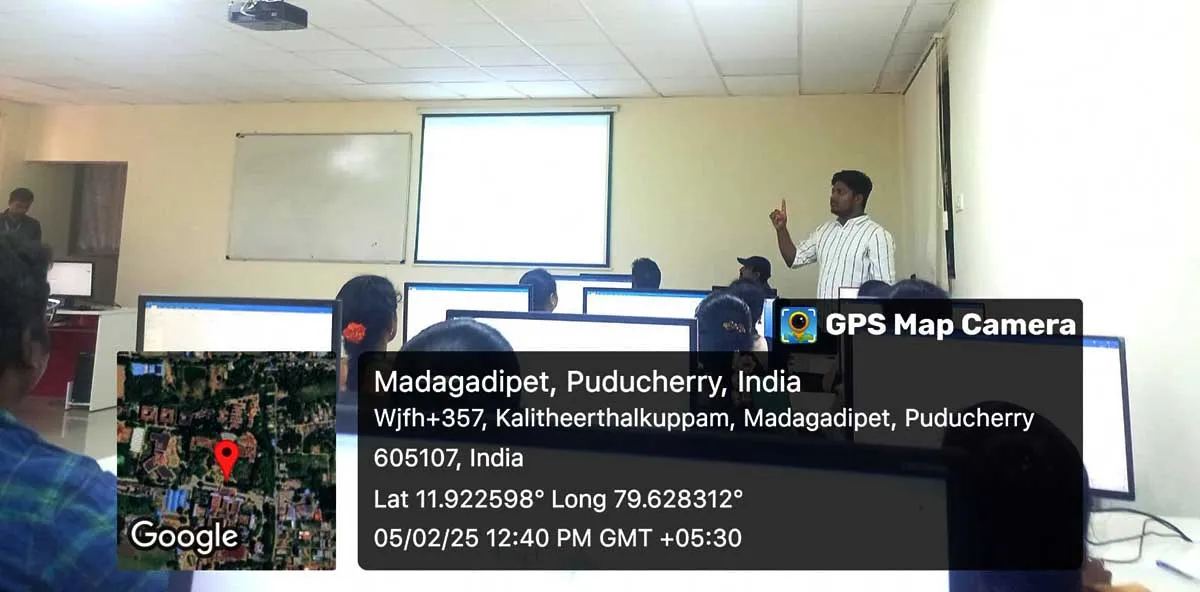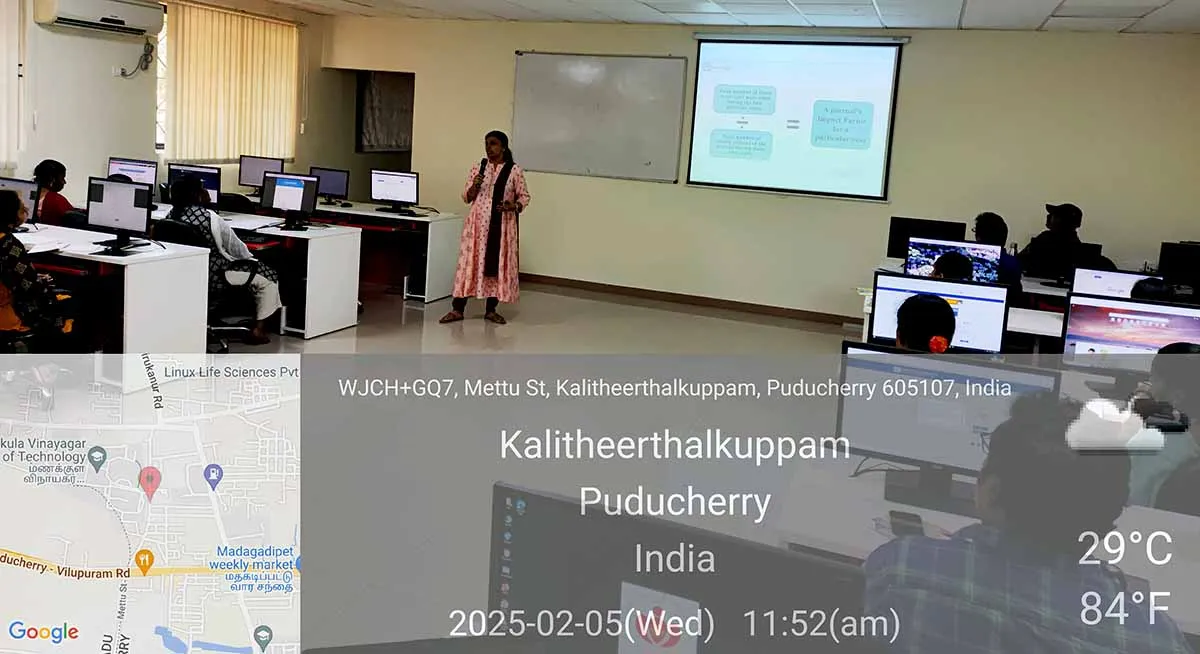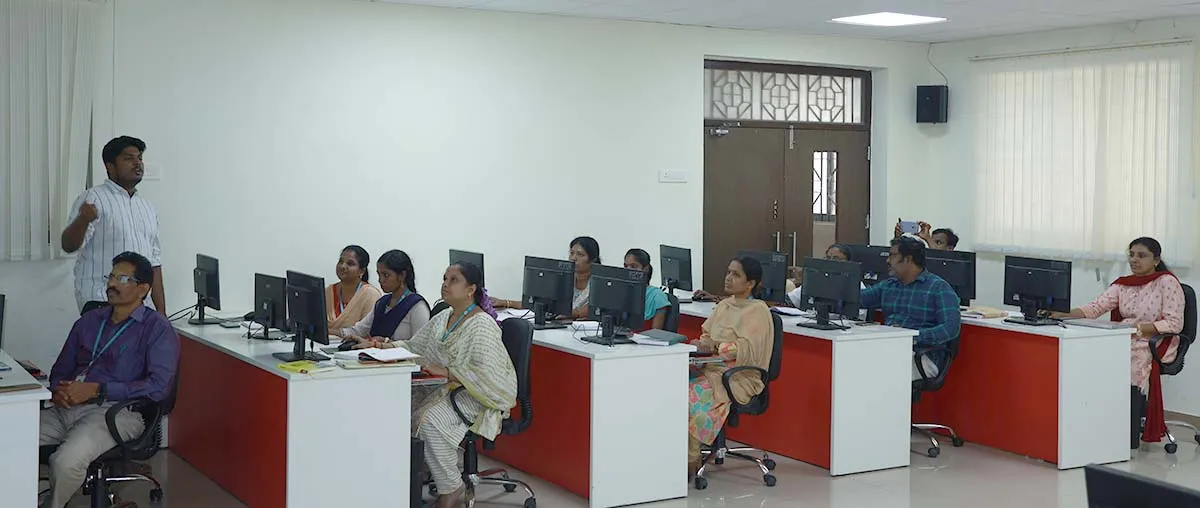Date: 24-12-2025
Time: 3:30 P.M – 4:30 P.M
Venue: SMVMCH Courtyard
Organized by: IQAC & Mulya Pravah Committee
Target Audience: UG or PG Students, Faculty, Non-Teaching Staffs
Participants: 250
Christmas day celebration 2025
Event Objectives
To foster a spirit of peace, joy, sharing and inclusiveness among students, faculty and staff in line with institutional core values.
To provide a platform for students to showcase cultural and artistic talents related to the Christmas theme.
To strengthen inter-professional bonding and campus well-being through a common festive gathering.
Event Detail Summary
The Christmas – IQAC Celebration at SMVMCH on 24 December 2025 was a value-oriented cultural event coordinated by the IQAC and Mulya Pravah Committee in the SMVMCH Courtyard, College Block. Through carols, cultural performances, symbolic rituals and interactive activities, the programme brought together students, faculty and staff to share the message of peace, joy and human values, and served as a platform for student expression and community bonding within the campus
Programme highlights
- The celebration began with a welcome address by the organizers, introducing the significance of Christmas and the values of compassion, service and humanity.
- This was followed by Christmas carols and thematic cultural performances (songs, skits and dances) by UG students, interns and staff, highlighting messages of unity and goodwill.
- A symbolic cake-cutting and distribution of sweets created a festive atmosphere and encouraged sharing among participants.
- A Santa Claus entry with interactive games and spot events engaged students and staff, promoting participation and team spirit.
- Faculty members delivered brief reflections linking Christmas values with the medical profession, patient care and ethics.
- The programme concluded with a vote of thanks and group photograph of participants and the organizing team
Participants
- Students from various batches of MBBS and allied health sciences.
- Interns and postgraduate residents.
- Teaching faculty and non-teaching staff from different departments.
- Members of IQAC, Mulya Pravah Committee and student volunteers involved in planning and conduct of the event.
Feedback about the programme
- Participants appreciated the lively and inclusive nature of the celebration and expressed that it created a refreshing break from routine academic activities.
- Students and staff remarked that the cultural events and interactive segments effectively conveyed the message of peace, sharing and togetherness, and suggested organizing similar value-based programmes regularly.
NIRF audit Academic Year 2025
Date: 17th & 18th November 2025
Time: 09:00 AM – 4:30 PM
Venue: College Council Hall
Organized by: Internal Quality Assurance Cell (IQAC), SMVMCH
Organizing Secretary: Dr. Deepika V
Moderator: Prof Umesh Chandrasekhar
Participants: 40 (Coordinators/Incharge, Administrative Staff, Supporting Team Members)
Introduction
The Internal Quality Assurance Cell (IQAC) of Sri Manakula Vinayagar Medical College & Hospital organized a two‑day NIRF Audit Review on 17th–18th November 2025. The objective was to evaluate institutional readiness for NIRF 2026 submission and improve documentation quality across all NIRF parameters. The session was designed to enhance the NIRF Parameter category of administrative and supporting staff—aligning with IQAC’s objective.
Objectives of the Programme
- Strengthening documentation and process readiness for all 22 NIRF medical parameters.
- Ensuring each NIRF in‑charge understands data requirements, templates, and evidence format.
- Building digital capabilities and AI-enabled documentation skills.
- Promoting financial awareness as part of institutional staff development.
Summary of Discussions with NIRF Parameter In‑Charges
During the audit, each parameter in‑charge presented the available data, identified gaps, and discussed improvements required. Key points are noted below:
- Student Enrolment Data: Year-wise admission data available; category distribution needs consolidation for last 3 years.
- Faculty Information: Sanctioned vs. working positions updated; visiting faculty records to be standardized.
- Examination Performance: MBBS results strong; PG NEET score tracking requires structured format.
- Academic Infrastructure: Library and lab resources adequate; need updated equipment inventory.
- Research Publications: PubMed/Scopus indexing lists updated; citation verification pending.
- Research Funding: Internal grants documented; need unified database for ICMR/DST/industry funding.
- Patents & Innovations: Innovations discussed; documentation of filed patents under compilation.
- Clinical Exposure: Patient load adequate; student exposure data to be linked with logbooks.
- Internship & Residency: Program data available; dropout statistics to be refined.
- Patient Care Quality: NABH indicators available; patient satisfaction report to be updated.
- Governance & Finance: Budget reports present; NMC compliance updates ongoing.
- Interdisciplinary Collaboration: MoU list under revision; need impact documentation.
Learning for growth: Office Skills and Personal Finance
Event Name: Learning for Growth: Office Skills and Personal Finance
Organized By: IQAC
Venue: Digital Lab
Date: 23-09-2025
Time: 2:00 P.M. – 4:00 P.M
Organizing Secretary & Resource Person: Mr. Rajesh D
Moderator: Dr. Deepika V
Participants: 40 (Administrative Staff, Non-teaching Staff, and Supporting Team Members)
Introduction
The Internal Quality Assurance Cell (IQAC) of Sri Manakula Vinayagar Medical College & Hospital (SMVMCH) organized a hands-on workshop titled “Learning for Growth: Office Skills and Personal Finance Awareness” on 23rd September 2025.
The session was designed to enhance the digital competency, communication efficiency, and financial literacy of administrative and supporting staff—aligning with IQAC’s objective to foster continuous professional development (CPD), capacity building, and life skill enrichment among non-teaching personnel.
Objectives of the Workshop
- To develop office automation and documentation skills using digital tools.
- To introduce participants to AI-assisted writing and automation platforms for official communication.
- To raise awareness on personal finance management, savings, and investment planning for long-term financial stability.
Session Overview
The workshop was conducted in two main segments — Digital Skill Enhancement and Financial Awareness for Personal Growth.
- Hands-on Training: Office Skills Development
- Topic: Digital Documentation & Automation Tools
- Trainer: Mr. Rajesh D
Participants were given step-by-step, hands-on training in two essential digital tools:
- Google Forms:
-
- Creating forms from scratch, adding questions, setting response types, and designing layouts.
- Demonstration on collecting data, viewing analytics, and generating automated reports.
- Practical exercises where each participant created and shared a working Google Form.
- Rytr.me (AI Writing Tool):
-
- Demonstrated how to use AI-assisted writing for official letters, circulars, and notices.
- Participants learned to generate error-free drafts, professional messages, and event announcements using Rytr.
- Emphasis was placed on time-saving, clarity, and communication consistency in office documentation.
This digital training segment improved the technical proficiency and digital literacy of the participants, empowering them to use technology confidently in their daily administrative tasks.
- Awareness Session: “Small Savings → Big Future”
The second segment was an interactive financial literacy session conducted by Mr. Rajesh D, moderated by Dr. Deepika V.
- The session started with a thought-provoking question:
“How many of you want financial freedom in the future?” - The discussion highlighted how minor adjustments in daily spending habits can lead to long-term financial growth.
- Concepts such as budgeting, saving discipline, emergency funds, recurring deposits, mutual funds, and long-term investments were introduced in a simplified and relatable manner.
- Participants were motivated to set personal financial goals and begin small savings plans to ensure economic independence and security.
This session was well-received, creating a positive awareness about personal finance management and future planning among staff members.
Participant Feedback & Outcomes
- Over 40 participants from various administrative and support departments attended the session.
- Participants expressed enthusiasm and shared that the session was highly practical, relevant, and motivating.
- Several requested a follow-up workshop focusing exclusively on savings and investment strategies.
- The workshop succeeded in building confidence, skill, and awareness in both professional and personal domains.
Impact & Institutional Significance
- Promoted digital empowerment and self-reliance among non-teaching staff.
- Contributed to capacity building and administrative efficiency, aligning with NAAC Criterion 6 (Governance and Leadership).
- Advanced financial literacy and life skill education, supporting NAAC Criterion 7 (Institutional Values & Best Practices).
- Strengthened the institutional culture of continuous learning and holistic staff development.
Conclusion
The workshop “Learning for Growth: Office Skills and Personal Finance Awareness” was an enriching initiative that successfully blended digital skill enhancement with personal finance education.
Through this program, IQAC reaffirmed its commitment to promoting professional growth, digital readiness, and financial wellbeing among institutional stakeholders, thereby contributing to the overall quality culture of SMVMCH.
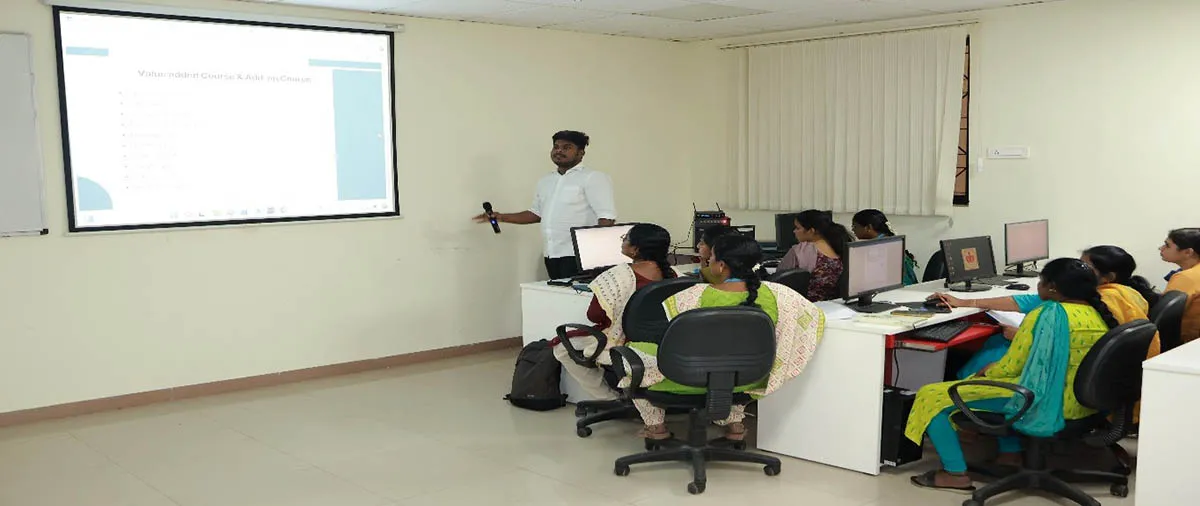
Workshop on “Choice Based Credit System (CBCS)”
Date: 25th July 2025
Time: 10:00 AM onwards
Venue: MEU Hall, College Block
Organized by: IQAC, SMVMCH
Organizing Secretary: Mr. Rajesh Dharmasekar
Participants: Faculty members from all departments, administrators, and curriculum committee members
Total Participants: 32
Objective
As part of the 5th Year Celebration of the National Education Policy (NEP) 2020, the Internal Quality Assurance Cell (IQAC) of Sri Manakula Vinayagar Medical College & Hospital (SMVMCH) organized a Workshop on the Choice Based Credit System (CBCS). The initiative aimed to sensitize faculty and curriculum planners on the practical implementation of CBCS in medical education in alignment with NEP 2020.
Resource Person
The session was led by Dr. (Prof.) Vivek Inder Kochhar, Vice Chancellor, Takshashila University, a visionary academic leader with expertise in curriculum development and NEP implementation.
Workshop Highlights
Dr. Kochhar delivered an enlightening and comprehensive session covering the philosophy, framework, and academic benefits of CBCS under NEP 2020. The talk emphasized flexibility, academic freedom, and competency-based progression. Major topics included:
- Introduction to NEP 2020: Its emphasis on flexibility, learner-centricity, and multidisciplinary learning.
- CBCS Framework Overview:
- The rationale behind credits and modular structure.
- The formula for credit calculation:
- 1 Credit = 15 hours of theory
- 1 Credit = 30 hours of practical/clinical/lab work
- 2 Credits = 30 hours for a theory or 60hr practical
Workshop Highlights
-
- How CBCS can be integrated into MBBS, MD, and MS curricula.
- Mapping competencies to learning outcomes.
- Defining the workload and outcomes per credit.
- Structuring elective modules and research credits.
- Assessment Strategies:
-
- Continuous and formative assessments.
- Linking competencies to internal assessments and summative evaluations.
- Curriculum Planning:
-
-
- Steps to frame CBCS-aligned curriculum plans.
- Role of curriculum committee and departmental coordination.
- Use of logbooks, reflective portfolios, and self-directed learning components.
-
Dr. Kochhar also discussed how implementing CBCS could improve the Gross Enrollment Ratio (GER) and increase student satisfaction and academic outcomes by offering flexibility and interdisciplinary learning.
Participation & Engagement
The workshop witnessed enthusiastic participation from more than 32 faculty members representing pre-clinical, para-clinical, clinical departments, as well as members of the academic and administrative wings. The session was interactive, with numerous queries regarding credit calculations, clinical hours, integration with electives, and student evaluation methods.
Session Conclusion
The session concluded with a felicitation ceremony, where a memento of honor and a certificate of appreciation were presented to Dr. Vivek Inder Kochhar by the organizing team. A group photograph was taken to commemorate the occasion, capturing the collective enthusiasm and academic spirit of the event.
Outcome & Impact
- Faculty gained clarity on the credit-hour system, especially in the context of medical education.
- The session served as a capacity-building platform to prepare the institution for phased implementation of NEP 2020 and CBCS.
- Actionable insights were taken for incorporating CBCS into the curriculum structure at SMVMCH, particularly for electives and skill-based modules.
Feedback & Follow-Up
Feedback collected from participants indicated high satisfaction, and further requests were made for follow-up workshops on curriculum mapping, assessment frameworks, and credit-based student tracking systems.
EmpowerEd 360: Hands-on Mastery of ICT Tools, Gamification & AI for Smarter Teaching
Event Name: EmpowerEd 360: Hands-on Mastery of ICT Tools, Gamification & AI for Smarter Teaching
Organized By: IQAC
Venue: Digital Library, SMMCH
Date: 16-05-2025 & 29-05-2025
Time: 9:00 A.M
A two-day Faculty Development Program titled “Empowered 360: Hands-on Mastery of ICT Tools, Gamification & AI for Smarter Teaching” was organized on May 16th and 29th, 2025 at the Digital Lab, SMVMCH. The objective of the FDP was to provide faculty members with the necessary skills and knowledge to effectively integrate modern digital tools, gamification strategies, and AI applications into their teaching practices.
Participants:
The program saw the enthusiastic participation of 60 faculty members, including Professors, Associate Professors, and Assistant Professors from various departments.
Organizers:
- Organizing Secretary: Mr. Rajesh, IQAC
- Event Coordinator: Dr. V. Deepika
Educational Sessions and Speakers:
- Dr. Surendran V (M.B.B.S (CM), DNB (CM), MBA (EPGDEPI), PGDMRCH, PGDPHSM, PGDFM)
-
- Topic: Gamification & AI for Smarter Teaching
- Focused on practical approaches to using game-based learning techniques and AI-powered tools to enhance classroom engagement and improve student outcomes.
- Mr. Rajesh, IQAC
-
- Topic 1: EmpowerEd 360: Hands-on Mastery of ICT Tools
- Topic 2: Notebook for Medical Education and Google AI Studio for AI-Driven E-Content Delivery
- Provided hands-on training and demonstrations on digital content creation, online collaborative tools, and the integration of AI in medical education.
Conclusion
The FDP was a resounding success, providing valuable insights and practical skills to faculty members for enhancing their teaching methodologies. Through interactive sessions and real-time demonstrations, the program fostered a greater understanding of ICT, gamification, and AI in education. Participants expressed positive feedback, highlighting the relevance and applicability of the content. This initiative significantly contributed to the professional development of faculty and supported SMVMCH’s mission toward innovative and technology-driven teaching.
Feedback Collected:
Comprehensive feedback was collected from all participants at the end of the sessions. The responses indicated high levels of satisfaction regarding the content, delivery, and usefulness of the topics covered. Participants appreciated the hands-on approach and expressed interest in attending similar future training programs to continue enhancing their professional skills.
Workshop on Effective Documentation Practices for Certificate & Value added program
Event Name: Workshop on Effective Documentation Practices for Certificate & Value added program
Organized By: IQAC
Venue: Digital Lab
Date: 12-06-2025
Time: 2:00 P.M. – 4:00 P.M
A workshop on “Effective Documentation Practices for Certificate & Value–Added Programs” was conducted on 12th June 2025 at the Digital Lab, Sri Manakula Vinayagar Medical College and Hospital (SMVMCH). The event was organized by the Internal Quality Assurance Cell (IQAC).
The program commenced with an address by the Director of SMVMCH, who emphasized the importance of certificate and value-added courses in enhancing students’ academic and professional competencies. He also highlighted the critical role of systematic documentation in maintaining the quality and accountability of such programs.
A total of 45 participants attended the session, comprising 25 faculty members (including Professors, Associate Professors, and Assistant Professors) and 20 clerical staff from various departments.
The session was conducted by Mr. Rajesh (IQAC), who provided detailed insights into documentation standards, maintenance of registers and records, audit preparedness, and alignment with accreditation requirements.
Feedback Summary:
The workshop concluded with a structured feedback session. Participants appreciated the clarity and practical value of the session. Feedback reflected a high level of satisfaction and a strong interest in similar capacity-building initiatives.
Conclusion:
The workshop enhanced participants’ understanding of effective documentation practices related to certificate and value-added programs. It contributed to strengthening institutional processes in alignment with quality and accreditation standards. The session was a valuable initiative toward fostering a culture of systematic documentation and continuous improvement.
FDP Program on “Enhancing E-Content Development & Delivery in Medical Education with AI: Hands-On Workshop”
Event Name: Enhancing E-Content Development & Development & Delivery in Medical Education with AI
Organized By: IQAC
Venue: Digital Library
Date: 10-04-2025 & 29-04-2025
Time: 9:00 A.M
The Faculty Development Program (FDP) titled “Enhancing E-Content Development & Delivery in Medical Education with AI: Hands-On Workshop” was conducted successfully on April 10th and 29th, 2025, at the Digital Lab, SMVMCH. Starting at 9:00 AM at the Digital Lab, Sri Manakula Vinayagar Medical College and Hospital (SMVMCH).
A total of 80 faculty members, including Professors, Associate Professors, and Assistant Professors from various departments, actively participated in the workshop.
The event was organized under the leadership of Mr. Rajesh, IQAC (Organizing Secretary) and coordinated by Dr. V. Deepika (Event Coordinator).
Educational Sessions and Key Speakers:
• Dr. S. Arunmozhi, Professor and Head, Department of ECE, Manakula Vinayagar Institute of Technology
-
- Session on Gamification and its application in enhancing student engagement and learning outcomes.
• Mr. Rajesh, IQAC, SMVMCH
-
- Session on Notebook for Medical Education and Google AI Studio for AI-Driven E-Content Delivery, demonstrating practical tools and AI applications for improving digital content creation and delivery in medical education.
The workshop provided participants with valuable hands-on experience and innovative strategies, empowering faculty to integrate cutting-edge AI tools into their teaching practices, ultimately enriching the educational experience for medical students.
Feedback: Participants provided highly positive feedback, appreciating the hands-on sessions, practical relevance, and innovative approaches shared during the workshop.
FDP Program on “Enhancing E-Content Development & Delivery in Medical Education with AI: Hands-On Workshop”
Event Name: Enhancing E-Content Development & Development & Delivery in Medical Education with AI
Organized By: IQAC
Venue: Digital Library
Date: 10-04-2025 & 29-04-2025
Time: 9:00 A.M
The Faculty Development Program (FDP) titled “Enhancing E-Content Development & Delivery in Medical Education with AI: Hands-On Workshop” was conducted successfully on April 10th and 29th, 2025, at the Digital Lab, SMVMCH. Starting at 9:00 AM at the Digital Lab, Sri Manakula Vinayagar Medical College and Hospital (SMVMCH).
A total of 80 faculty members, including Professors, Associate Professors, and Assistant Professors from various departments, actively participated in the workshop.
The event was organized under the leadership of Mr. Rajesh, IQAC (Organizing Secretary) and coordinated by Dr. V. Deepika (Event Coordinator).
Educational Sessions and Key Speakers:
• Dr. S. Arunmozhi, Professor and Head, Department of ECE, Manakula Vinayagar Institute of Technology
-
- Session on Gamification and its application in enhancing student engagement and learning outcomes.
• Mr. Rajesh, IQAC, SMVMCH
-
- Session on Notebook for Medical Education and Google AI Studio for AI-Driven E-Content Delivery, demonstrating practical tools and AI applications for improving digital content creation and delivery in medical education.
The workshop provided participants with valuable hands-on experience and innovative strategies, empowering faculty to integrate cutting-edge AI tools into their teaching practices, ultimately enriching the educational experience for medical students.
Feedback: Participants provided highly positive feedback, appreciating the hands-on sessions, practical relevance, and innovative approaches shared during the workshop.
Report on Workshop on “Skill Boost: Excel and Design Essentials”
Organized by the Internal Quality Assurance Cell (IQAC)
Date: 20th March 2025
Venue: Digital Library – Ground Floor, College Block
Participants: 30 Clerks and Technicians from Various Departments
Guest Speakers: Mr. Rajesh D, Dr. Soundariya K, Dr. Deepika V
About the Workshop
The Internal Quality Assurance Cell (IQAC), in collaboration with the SkillUp Club – Empowering Clerks & Technicians, successfully conducted a one-day workshop titled “Skill Boost: Excel and Design Essentials” on March 20, 2025. The objective was to enhance the proficiency of clerks and technicians in Microsoft Excel, digital design tools, and automation techniques to improve administrative efficiency.
Key Sessions
- Brochure & Flyer Preparation – A hands-on session by Mr. Rajesh D, introducing participants to essential design tools and best practices for creating professional brochures and flyers.
- Certificate Preparation and Automation – A session focused on automating certificate generation using Excel and mail merge, making bulk processing more efficient.
- Tips & Tricks in Excel and AI Usages – An advanced training module covering Excel formulas, data analysis techniques, and AI-driven automation tools to optimize workflow.
- Competition – Participants tested their newly acquired skills in Excel and design in a fun and engaging competition, evaluated by Dr. Deepika V and Dr. Soundariya K.
Competition & Prize Distribution
A friendly competition encouraged participants to apply their skills in real-world tasks. The Director, Dean (Academic), and Dean (Research) presented 1st, 2nd, and 3rd prizes to the winners, while all attendees received a pen and certificate, distributed by Dr. Soundariya, Deputy Dean (Academic – UG).
Launch of ‘Manakula THIRAN’
The workshop also marked the official launch of ‘Manakula THIRAN – THIRAN: Training for Health Institution Related Assistants and Nurturing Skills’ by our esteemed Director. This initiative aims to provide structured skill development programs for health institution assistants, ensuring continuous learning and professional growth.
Conclusion
The workshop was well-received, with participants appreciating the hands-on approach and practical insights. The event successfully empowered clerks and technicians with essential digital skills, aligning with Skill Up Club’s mission to support non-teaching staff through training and professional development.
FDP: "Mentorship in Action: Quality-Driven Strategies for Teaching, Leadership, and Team Building"
Nature of the Program: Faculty Development Program (FDP)
Date: 03.10.2024 & 04.10.2024
Venue: Own Book Reading Hall, Ground Floor, College Block
Participants:
- 03.10.2024: 50 Vertical Mentors (Professors, Associate Professors, Assistant Professors)
- 04.10.2024: 50 Vertical Mentors (Professors, Associate Professors, Assistant Professors)
- Total – 100 Participants
Organizing Secretaries: Dr. Deepika V. & Dr. Soundariya K.
Guest Speaker: Mrs. Thulasi Priya, Linguistic Coach, Educational Counsellor, POSH/POCSO Enabler, and FDP/MDP Coach
Overview:
The two-day Faculty Development Program (FDP) on “Mentorship in Action: Quality-Driven Strategies for Teaching, Leadership, and Team Building” was designed to enhance mentoring skills and leadership abilities among faculty members. The workshop addressed key areas such as pedagogical innovation, team building, and performance management. The sessions aimed to equip educators with the tools to foster a collaborative and goal-oriented environment.
Topics Discussed:
- Pedagogical Skills: This session focused on innovative teaching methods like active learning, flipped classrooms, and problem-based learning, all aimed at improving student engagement. Participants were introduced to strategies for classroom management, ensuring a conducive learning environment, and the development of effective assessment tools to evaluate student performance comprehensively. The objective was to emphasize the importance of these innovative methods in enriching student participation and learning outcomes.
- Team Building and Collaboration: In this segment, faculty were taught about understanding team dynamics and the roles within a team. Strategies for building high-performing teams were highlighted, with a focus on effective delegation and empowering team members. Additionally, the significance of collaboration and networking, both internally and externally, was discussed, encouraging participants to foster partnerships that can drive institutional success. The objective was to stress the power of collaboration and teamwork in achieving collective goals.
- Mentoring and Coaching: This session emphasized the crucial role that mentoring plays in leadership development. Faculty were trained in coaching techniques to support and nurture their team members, helping them grow professionally. The importance of providing constructive feedback and planning for leadership succession was also discussed, with an aim to develop future leaders within the institution. The objective was to highlight how mentorship and coaching can promote leadership and personal growth.
- Performance Management: Participants were taught techniques for setting clear, achievable goals for both individuals and teams, as well as methods for measuring and evaluating performance. The session also underscored the importance of continuous improvement and how recognition and rewards can motivate individuals and teams to excel. The objective was to reinforce the significance of goal setting, performance tracking, and recognition in driving success and fostering a culture of excellence.
Feedback and Certification:
Feedback was collected from participants via Google Forms by the IQAC, and E-certificates were issued to all participants through email.
The program was highly engaging, and the participants appreciated the practical insights and strategies shared, which will be beneficial for fostering a culture of mentorship, leadership, and innovation within the institution.
Internal Quality Assurance Cell (IQAC) & Library
Report on Management Development Program (MDP)
on
SMART - Skills for Managing Academic and Research Tasks
The Management Development Program (MDP) on SMART – Skills for Managing Academic and Research Tasks was successfully conducted on 5th February 2025 in Digital Library from 08:30AM – 04:30PM. This workshop was designed to enhance the technical and academic management skills of clerks and technicians across various departments. The objective was to equip participants with essential skills required for managing academic and research-related tasks efficiently.
1. Introduction to Research Databases
This session provided an insightful introduction to Research databases and their structure their significance in academic and research work. The speakers elaborated on different types of databases, approved by National Medical Commission (NMC) like Pubmed,Scopus,DOAJ,Science Citation Index,Embase,medline
2. Reference Writing –Vancouver Style
This session focused on the importance of proper referencing in academic and research documents. The Vancouver referencing style was introduced in detail, covering citation rules, formatting guidelines, and practical demonstrations using APA Citation Generator on how to cite sources correctly in research papers and reports.
3. Impact Factor
Dr. Deepika explained the concept of the Impact Factor, its significance in academic publishing, and how researchers can assess the credibility of journals. The session included insights into journal indexing & citation metrics
3. Impact Factor
Dr. Deepika explained the concept of the Impact Factor, its significance in academic publishing, and how researchers can assess the credibility of journals. The session included insights into journal indexing & citation metrics
4. Tips & Tricks in Word and Excel
This hands-on session focused on advanced techniques in Microsoft Word and Excel, which are crucial for clerical and research documentation. Participants learned useful shortcuts, data organization methods, and formatting techniques to enhance productivity.
Conclusion
The workshop successfully provided valuable insights into managing academic and research tasks efficiently. The interactive sessions and practical demonstrations enabled the participants to gain hands-on experience in essential tools and methodologies. The participants expressed positive feedback, appreciating the relevance of the topics covered and the expertise of the speakers. The program concluded with a vote of thanks to the organizers and speakers for their contributions in making the workshop a success.


